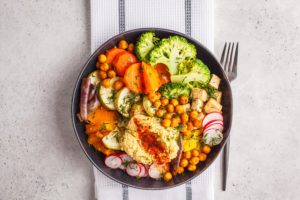 Along with maintaining an active lifestyle, the food you eat plays a significant role in the health of your bones. Food choices can either help or hinder bone health, which ultimately influences your risk for falls and fractures.
Along with maintaining an active lifestyle, the food you eat plays a significant role in the health of your bones. Food choices can either help or hinder bone health, which ultimately influences your risk for falls and fractures.
What are the nutrients you need for bone health? Calcium, vitamin D, and vitamin K, right? Yep. But that’s not it. Protein, magnesium, and potassium are essential for healthy bones. As great as crushing yogurt, cheese, and other dairy products can be, they certainly can’t handle the job without a little help.
Advertisement
If you’re currently eating a well-balanced diet high in fruits, vegetables, dairy, nuts, and lean proteins, you’re probably getting what you need. But if you’re looking for some under-the-radar foods to bolster your bones, here are a few to try out:
- Sweet potato is high in potassium and magnesium, which are two nutrients required to balance vitamin D. Vitamin D is essential to bone health, and potassium and magnesium can ensure it’s where it’s supposed to be to do its job.
- Figs are a dense source of calcium, potassium, and magnesium that contribute to healthy bones. Having them as a snack or putting them on oats or salads are easy ways to fit them in.
- Almond butter is another quality supporting actor in healthy bones. Two tbsp. has about 112 mg of calcium and 240 mg of potassium, as well as offering a tiny dose of protein.
- High protein foods contribute to healthy bones too. They take the stress off your bones and provide some padding to keep bones safe.
- Green foods like broccoli, kale, bok choy, and turnip are also excellent sources of the nutrients needed for healthy bones.
On the other hand, there are some foods that can hinder bone health. Here they are (you might be surprised by a few):
- Beans: Although beans are a healthy addition to your diet, they aren’t the best if you’re trying to maximize calcium absorption. They are rich in phytates, a compound that interferes with calcium. You can get around this problem by soaking beans before cooking.
- Wheat bran is also high in phytates, and there is evidence that it can reduce the calcium you’re getting from foods eaten at the same time. If you’re supplementing with calcium or spreading butter on wheat toast to get a calcium boost, rethink the strategy.
- Eating too much salt can cause bones to lose calcium. Adding table salt to home-cooked meals or recipes won’t have a significant effect, but eating processed foods will. Limit processed food intake to keep salt levels safe for bone (and heart) health.
